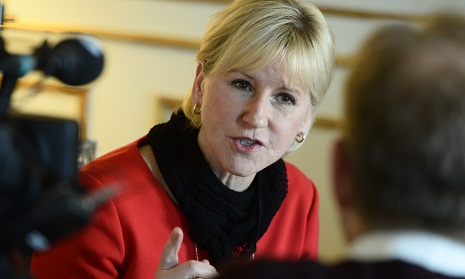Comments by Margot Wallström, the foreign minister, represented a “flagrant interference in internal affairs, which is not accepted in international conventions,” it added, according to an official statement carried by state news agency SPA.
Stockholm was apparently bounced into terminating its decade-long weapons memorandum with the Saudis after they blocked Wallström from making a speech on human rights to Arab leaders.
The snub was compounded when Arab League foreign ministers backed the Saudis and expressed “condemnation and astonishment” at her planned remarks, which were “incompatible with the fact that the constitution of the kingdom of Saudi Arabia is based on sharia [law]”.
Earlier this year Wallström openly denounced Saudi Arabia’s flogging of liberal blogger Raif Badawi, describing it as a “cruel attempt to silence modern forms of expression” that must be stopped.
The sudden rift with Arab leaders came as a shock to Sweden’s left-leaning coalition government, which had expected to bask in the plaudits it won after becoming the first EU member to recognise the Palestinian state in October.
“We were surprised at the Arab League reaction – the foreign minister was a guest of honour to speak at the meeting, and of course at very short notice it was a very surprising that she couldn’t make her speech,” said Erik Boman, a foreign ministry spokesman.
The termination of the arms agreement has been met by a stunned silence from Sweden’s top business leaders, more than 30 of whom signed an open letter last week imploring the government to honour the agreement and maintain the country’s reputation as a trading partner.
The left in Swedish politics has barely disguised its glee at scoring what it sees as a rare victory after the Social Democrat-led minority coalition faced a series of setbacks, including being forced to adopt a conservative budget after rightwing parties united to outvote the government. The prime minister, Stefan Löfven, who for many years was a trade union champion of Sweden’s powerful defence sector, had favoured renegotiating the Saudi weapons deal.
Wallström, who had also backed the arms deal, appeared to make the best of the diplomatic setback when she tweeted: “Leadership = not just sailing downwind! Most questions require courage and patience. Proud to be clear on democracy and human rights.”
Wallström pledged last month that a “feminist foreign policy” would become “an integral part of activities throughout the Swedish foreign service”, aiming to strengthen women’s rights, improve access to resources and increase women’s representation.
But Carl Bildt, the former foreign minister, wrote on his blog that Sweden had been damaged and the termination of the arms agreement would be met with joy in competitor nations. At least, he wrote on Twitter, the government had avoided a “complete meltdown” because the Green party, the junior partner in the coalition, had made it clear it was emphatically opposed to trading arms with Saudi Arabia.
The bust-up could also weaken Sweden’s chances of re-election to the UN security council next year, which the government has made a strategic foreign policy goal. “No one will listen to Sweden now for many years to come,” said Per Jönsson, a Middle East expert at the Institute of Foreign Affairs in Stockholm. Worsening relations with Israel and the Arab world meant Wallström, seen as a star when she took office, was now “becoming an obvious problem”, commented Sweden’s leading business newspaper, Dagens Industri.
The coalition had dragged its feet and lost the initiative over the Saudi arms deal, said Ulf Bjereld, a professor of political science at Gothenburg University, but the rupture with Saudi Arabia might also work in the country’s favour.
“Sweden has shown the world that when we talk about human rights it is not just words but also actions, which could lead to a picture of Sweden as a state with great integrity on these issues,” he said.
More about:
















































